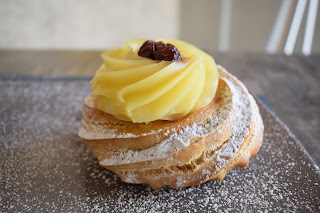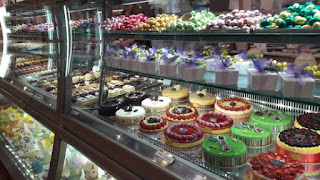Italian celebration this year coincides with Mothering Sunday in UK
While today marks Mothering Sunday - or Mother’s Day - in the United Kingdom and elsewhere, the Italian tradition is that celebrations on this day in the religious calendar are for Father’s Day.
La Festa del Papà in Italy owes its history to La Festa di San Giuseppe - St Joseph’s Day - the annual celebration that has been held since the Middle Ages to recognise the role of Joseph, the husband of Mary, as the legal if not the biological father of Jesus Christ.
In Catholic tradition, Saint Joseph is the embodiment of the ideal father, a strong, pious character perfectly suited to fulfil his role as protector of and provider for his family.
For many years, the Festa di San Giuseppe - which always falls on March 19, regardless of whether it is a weekday or a weekend - remained a largely religious celebration. But, thanks to the growth of commercialism around family celebration days, it has taken a lead from Father’s Days around the world, and in particular the United States, and expanded into something bigger.
So nowadays, in common with Father’s Days around the world, La Festa del Papà is an occasion for children to show their appreciation and affection for their own fathers by making cards and giving treats and gifts.
Schools will often devote time in the week leading to March 19 by setting aside craft lesson time to making cards and gifts, with students encouraged to fill the card with their own verses.
And naturally, being Italy, gifts often take the form of food, with a number of different cakes and pastries becoming traditional on Father’s Day.
 |
| An example of Zeppole di San Giuseppe, one of Italy's traditional Father's Day treats |
When they arrived, Joseph is said to have helped support the family by making and selling sweet pancakes.
The classic Italian Father’s Day pastries are Bignè di San Giuseppe, fried cream puffs filled with custard and dusted in icing sugar. Although Bignè di San Giuseppe are available throughout Italy all year round, they are made in particular quantities around Father’s Day.
In the south of Italy, the equivalent is the Zeppole di San Giuseppe, a similar concoction to Bignè, made with puff pastry, custard and icing sugar, topped with a glazed cherry.
A recipe for these zeppole appeared in Cucina teorico-pratica, a 19th century cookery guide compiled by Ippolito Cavalcanti, a food-loving aristocrat who went under the title Duke of Buonvicino, first published in 1837 and still being reprinted today. The book is considered something of a bible of Neapolitan cuisine.
In Sicily, meanwhile, the Sfincia di San Giuseppe is filled with sweet ricotta, candied fruit and chopped pistachio nuts, while shops in the north of Italy might have Ravioli di San Giuseppe - ravioli made with shortcrust pastry and filled with jam.
The Festa di San Giuseppe in Sicily is also celebrated in some households with the preparation of a soup called maccu di San Giuseppe, made with crushed fava beans, also known as broad beans.
Another part of the gift-giving element of the Festa del Papà is thought to come from Saint Joseph’s role as the patron saint of carpenters. Originally, wooden toys and trinkets were exchanged between all relatives on Festa di San Giuseppe, the practice evolving into one in which children gave wooden gifts to their father.
Travel tip:.jpg)
An overhead view of Zaha Hadid's extraordinarily
futuristic Stazione Napoli-Afragola
Ippolito Cavalcanti, the aristocratic gourmet who described Zeppole di San Giuseppe in his cookery guide Cucina teorico-pratica, was born in Afragola, a city today of almost 65,000 people but subsumed into the sprawl of greater Naples. Situated around 10km (6 miles) northeast from Piazza del Plebiscito, Afragola’s history is thought to date back to around 300BC when it was settled by a tribe called the Samnites, although remains dated as of Bronze Age vintage, thought to have been buried in an eruption of Vesuvius, were found in 2005. Today’s Afragola, sadly, is an area of social problems, high unemployment and high crime rate, yet it is home to one of Italy’s most futuristic railway stations, the extraordinary Napoli-Afragola station designed by British-Iraqi architect Zaha Hadid and opened in 2017 for a new high speed line from northern to southern Italy.
Travel tip:
Iginio Massari's Pasticceria Veneto is consistently
recognised as one of Italy's best pastry shops
The best pastry shop in all Italy - and there is plenty of competition - is generally reckoned to be the multiple award-winning Pasticceria Veneto in Via Salvo D'Acquisto in the northern city of Brescia. Opened in 1971 by the Brescia-born pastry chef Iginio Massari, Pasticceria Veneto has dominated the pasticcerie section of the annual Gambero Rosso awards since 2011, receiving the coveted Tre Torte mark from the food magazine every year. The store, often described as a pastry laboratory rather than simply a bakery thanks to 80-year-old Massari’s constant innovation, has been stocking a number of treats in anticipation of Father’s Day. The chef’s own creation for the occasion is a caramelized millefeuille.
Also on this day:
1661: The birth of musician Francesco Gasparini
1816: The death of physician and businessman Filippo Mazzei
1914: The death of seismologist Guiseppe Mercalli
1923: The birth of cartoonist Benito Jacovitti
1943: The birth of technocrat PM Mario Monti

No comments:
Post a Comment